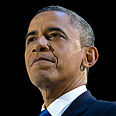

President Barack Obama's election victory opens the way for renewed efforts to revive moribund peace negotiations between Israel and the Palestinians, Middle East envoy Tony Blair said on Wednesday.
Speaking hours after Obama won a second term in office, the former British prime minister told Reuters he did not believe the United States had lost interest in the decades-old conflict, adding that he hoped to see a fresh initiative soon.
Related stories:
- US: Obama re-elected for second term
- PM to ministers: Don't talk about Obama
- Palestinians urge Obama to stop siding with Israel
"I think President Obama's re-election gives us the chance to go back into it with a renewed sense of momentum and a plan to move it forward. I think, expect, hope that this is what will happen," he said, speaking from his Jerusalem offices.
Blair represents the so-called "quartet" of Middle East peacemakers - the United States, European Union, United Nations and Russia - and has visited Israel and the Palestinian Territories some 90 times since taking the job in 2007.
Blair said he understood Palestinian frustration, but dismissed suggestions that, with more than 500,000 Israelis now living on land seized in the 1967 war, the two-state solution was dead.
"It is very fashionable at the moment to say the two-state solution is not going to work. Just examine the alternative for a moment. What does a one-state solution mean? It means you institutionalise conflict right at the heart of whatever that state might look like," he said.
Understanding
Looking to seize the initiative, the Palestinians have said they will ask the United Nations General Assembly later this month to upgrade their diplomatic status and recognise them as an "observer state" rather than an "observer entity".
Israel says statehood can come only through direct talks and has threatened retaliation if the Palestinians press ahead, saying such unilateral action ran counter to previous accords.
Washington has also denounced the UN drive and some Western diplomats fear a General Assembly vote could smother any chance of fresh negotiations at a time when Obama's victory has brought a flicker of optimism over renewed dialogue.
Palestinian President Mahmoud Abbas has said he will be ready for talks as soon as the UN vote is out of the way, suggesting he will finally drop a pre-condition that Israel halt all settlement building before returning to the table.
Blair declined to endorse or condemn the Palestinian move, but warned against hasty reactions.
"We have to understand the position the Palestinians find themselves in. It is all about the credibility of the steps towards statehood. It is very much in our interests to offer them a way forward that allows us one way or another to get back to the negotiating table."
With Israeli Prime Minister Benjamin Netanyahu facing his own battle for re-election on Jan. 22, the Palestinian issue has fallen off the domestic political agenda.
'No change in Obama's view'
Given the numerous hurdles on the road to peace, many analysts have questioned whether Obama will want to expend any further political capital on the Middle East conflict after his first-term efforts ended in failure and acrimony.
"I don't think there has been any change in President Obama's view, which is that it is in the strategic interest of the United States and the world that a resolution of the Israeli-Palestinian issue is found," Blair said.
Earlier, the US ambassador to Israel, Dan Shapiro, said it was unrealistic to think Obama would choose to ignore the Palestinian issue in his second term.
"It always finds its way back onto the agenda. You can't expect this to go away or remain on the back-burner," he said, without offering a prediction of what Obama might do.
Blair also declined to comment on future steps, saying only that it was important to find the correct framework for talks.
"My view is that this issue remains fundamentally important and can be resolved. I have no doubts it can be, but whether it will be is another matter."
- Receive Ynetnews updates
directly to your desktop















